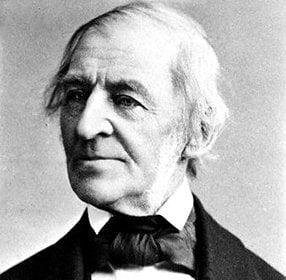The Park
The prosperous and beautiful
To me seem not to wear
The yoke of conscience masterful,
Which galls me everywhere.
I cannot shake off the god;
On my neck me makes his seat;
I look at my face in the glass,——
My eyes his eyeballs meet.
Enchanters! enchantresses!
Your gold makes you seem wise;
The morning mist within your grounds
More proudly rolls, more softly lies.
Yet spake yon purple mountain,
Yet said yon ancient wood,
That Night or Day, that Love or Crime,
Leads all souls to the Good.
This poem is in the public domain. Published in Poem-a-Day on April 21, 2024, by the Academy of American Poets.
“The Park” appears in Poems of Ralph Waldo Emerson (Oxford University Press, 1921). In his essay, “Poetry and Imagination,” originally published in 1875, Emerson affirmed that “poetry is organic. We cannot know things by words and writing, but only by taking a central position in the universe and living in its forms. […] All the parts and forms of Nature are the expression or production of divine faculties, and the same are in us. And the fascination of genius for us is this awful nearness to Nature’s creations.” Emerson went on to further discuss the rigor of poetry and posed the question: “Is not poetry the little chamber in the brain where is generated the explosive force which, by gentle shocks, sets in action the intellectual world?” He then wrote, “Bring us the bards who shall sing all our old ideas out of our heads, and new ones in; men-making poets; poetry which […] is capable of restoring the dead to life—poetry like that verse of Saadi, which the angels testified ‘met the approbation of Allah in Heaven;’ poetry which finds its rhymes and cadences in the rhymes and iterations of Nature, and is the gift to men of new images and symbols, each the ensign and oracle of an age; that shall assimilate men to it, mould [sic] itself into religions and mythologies, and impart its quality to centuries;——poetry which tastes the world and reports of it, upbuilding the world again in the thought […]. Poetry must be affirmative. It is the piety of the intellect. ‘Thus saith the Lord,’ should begin the song. The poet who shall use Nature as his hieroglyphic must have an adequate message to convey thereby. […] The supreme value of poetry is to educate us to a height beyond itself, or which it rarely reaches;—the subduing [of] mankind to order and virtue.”

